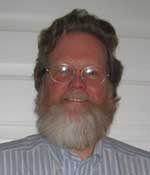Gregory Meisner
Dr. Gregory P. Meisner is a Staff Researcher at General Motors Global Research & Development. He received his B.A., M.S., and Ph.D. degrees in Physics from the University of California, San Diego, where his research focused on the superconductivity and magnetism of new ternary compounds. Following a post doc at Los Alamos National Lab, where he studied heavy fermion systems, he joined GM and has been conducting industrial research there for over 28 years. His physics research interests have included superconductivity, magnetism and high performance permanent magnets, hydrogen storage measurements and materials for fuel cell vehicles, and advanced thermoelectrics materials and devices for automotive waste heat recovery. He has published over 90 refereed publications and has 10 patents. He received two John M. Campbell Awards from General Motors Global Research & Development for “An Outstanding Contribution to Filled Skutterudites: High-Efficiency Thermoelectric Materials” (1997), and “Accurate Measurements of Hydrogen Storage” (2004), and he is a Fellow of the American Physical Society. He has served as Member of the APS Committee on Careers & Professional Development (2011- 2013), Chair of the Selection Committee for the APS Prize for Industrial Applications of Physics (2007-2011), Member of the APS Selection Committee for the George E. Pake Prize (2009-2010), Member of the Executive Committee of the APS Forum on Industrial and Applied Physics (FIAP) (2004-2007) and has served as APS Focus Session Organizer for FIAP. He is also a member of the American Association for the Advancement of Science, American Ceramic Society, Materials Research Society, Sigma Xi, American Vacuum Society, and American Chemical Society. His is currently the Principle Investigator for GM’s research projects on thermoelectric technology for automotive waste heat recovery.
Statement:
One of the most pressing needs faced by APS is to more successfully cultivate students’ interest in physics, encourage them to pursue careers in physics, and retain them as active members of APS. Many physics students, however, follow professional careers that are not in academic institutions, and consequently they tend to not remain connected to APS. This is because the perceived benefit of APS membership and attending APS meetings is too small. This is particularly true for industrial physicists, and it is also true for applied physicists working in other fields. An important role for FIAP is to further APS’s ability to meet the physics career development needs of industrial and applied physicists by, for example, providing linkage between the somewhat diverse physics communities of industrial research, national labs, and academia. The goal is to create and take advantage of opportunities designed to enhance and extend the participation of physics students in the application and practice of physics as they become professional industrial or applied physicists. One way to do this is to increase the presence of applied physics topics relevant to industry, government, and universities in the Symposia and Focused Sessions held at APS Meetings. Equally important is enhancing the way APS recognizes significant physics accomplishments by industrial and applied physicists via fellowships, awards, and prizes. My previous participation on the FIAP Executive Committee, FIAP’s Fellowship Committee and two APS Prize Selection Committees qualifies me to help FIAP and APS address these matters. As FIAP Councillor, I will serve as liaison between the FIAP Executive Committee and the APS Council, and I will work within FIAP and the APS Council to support efforts to appeal to and retain involvement of all physicists in APS.

 Biography:
Biography: